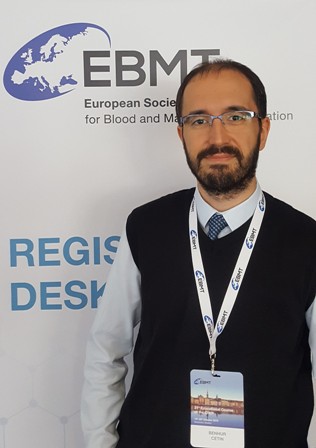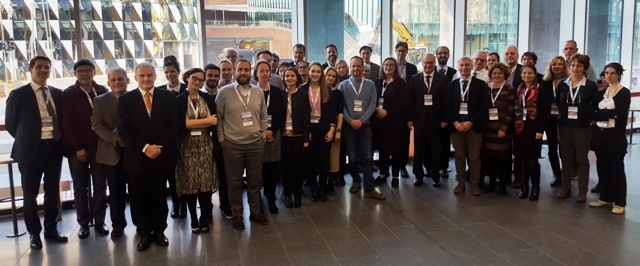
25-27 October 2018 in Stockholm, Sweden
Benhur Sirvan Cetin from Turkey chronicles the content of the sessions.
The topics selected for this meeting included different aspects of management of infectious diseases in HSCT patients. The course consisted of four educational sessions: Viral Infections, Fungal Infections, Bacterial Infections, and Immunology and new concepts. Within the sessions five different case reports were presented. Presenters were selected and awarded by the Scientific Committee. Case presentations offered the participants the opportunity to interact with experts and discuss with audience as well.
In the first day, Hermann Einsele focused on new treatment strategies of cytomegalovirus infections. Current strategies and novel anti-CMV agents were discussed. Manipulation of the CMV-directed immune responses was another important point of the lecture. Prophylaxis and different treatment strategies of EBV infection and other herpesvirus infections including HHV-6 and VZV were discussed by Jan Styczynski. That was followed by lecture of Michael Boeckh focused on respiratory virus infections including significance of pre-transplant infections and by lecture of Malgorzata Mikulska about hepatitis and gastrointestinal infections. In the direction of new perspectives from an immunological approach to infections in HSCT, Jacobo Peccatori underlined potential role of IgM-enriched immunoglobulins as adjuvant therapy in MDR infections and Michele Malagola discussed the role of anti CMV-specific immunoglobulins for prophylaxis and treatment. In the second session (Fungal Infections), algorithm for diagnosing IFD in hematological patients and performance of biomarkers and novel technics for identification of fungi discussed by Simone Cesaro, followed by lecture of Ola Blennow focused on management of mold infections. The last lecture of the first day was about Pneumocystis jiroveci and presented by Christine Robin. Curative treatment strategies of PcP and management of clinical failure were discussed.
In the second day, we started with Bacterial Infections Session. Firstly, Diana Averbuch talked about management of multiresistant bacterial infections in HSCT patients. Optimization of targeted antibiotic therapy and negative effects of fluoroquinolone prophylaxis were widely discussed. Then, followed by lecture of Malgorzata Mikulska focused on uncommon bacterial infections including legionella and nocardia. Kristoffer Strålin discussed management of severe sepsis. The NEWS scoring system for screening of sepsis, importance of “1-hour-bundle” and antimicrobial stewardship were the key points of his presentation. Additionally, adenovirus infections in the immunosuppressed post-transplant host were discussed. Per Ljungman talked about importance of adenoviral infections and viral predictors of clinical outcome for CMV, EBV and Adenovirus infections. Ponni Sivaprakasam discussed adenoviremia as a predictor of clinical outcome in the pediatric HSCT recipient. We saw that, gastrointestinal tract appeared to be the driver for adenovirus replication and viral load (peak adenovirus plasma level and duration of viremia) directly affected clinical outcome. In the fourth session the topic was immunology and new concepts. Jaroslaw Bilinski showed the effects of gut microbiome on the results of alloHSCT and fecal transplantation was discussed. Important issues in vaccination of HSCT patients presented by Catherine Cordonnier followed by lecture of Georg Maschmeyer focused on new drugs and risk for infection. Lidia Gil discussed genetic susceptibility to infections in HSCT patients. We saw that polymorphisms of TLR4, Dectin-1, and PTX3 in donors increase susceptibility to invasive aspergillosis while LBP polymorphism is associated with the risk of developing Gram-negative bacteremia after transplantation. Last presentations were about novel publications about stem cell transplantation which were published last year and presented by Rafael de la Camara and Catherine Cordonnier.
Case reports were presented by: Benhur Sirvan Cetin (Turkey), Daniela Taurino (Italy), Sabrina Giammarco (Italy), Yulia Rogacheva (Russia) and Liudmila Fedorova (Russia).
In my view, the course was a great opportunity to listen to expert speakers, interact and network with other researchers.

Pediatric Infectious Disease Department, Erciyes University, Medical Faculty, Kayseri, Turkey
